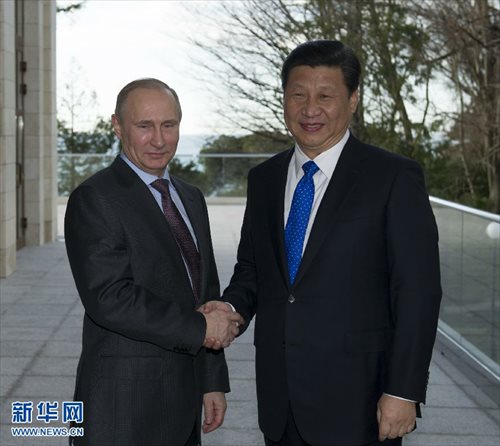HOME >> CHINA
Xi meets Putin in Sochi
By Zhang Yiwei Source:Global Times Published: 2014-2-7 1:48:01

Chinese President Xi Jinping (right) meets with Russian President Vladimir Putin in Sochi, Russia, February 6, 2014. (Xinhua/Huang Jingwen)
Chinese President Xi Jinping arrived at Sochi in Russia Thursday afternoon to attend the opening ceremony of the 22nd Winter Olympic Games and met with Russian President Vladimir Putin, a move analysts said reflects China's strong backing of bilateral relations with Russia.
At the invitation of Putin, Xi will stay in Sochi February 6 to 8, the first time a Chinese head of State has attended a major sports event abroad.
Xi had held talks with his Russian counterpart Putin on Thursday afternoon in a bid to further advance bilateral ties in 2014, the Xinhua News Agency reported.
Both leaders are to exchange views on pushing forward cooperation in large and practical projects and in people-to-people exchanges, as well as on major international and regional issues.
Security has been a big international concern to the Games due to Sochi's proximity to the volatile, mainly Muslim region of North Caucasus.
Suicide bombers killed at least 34 people in the southern Russian city of Volgograd, 700 kilometers northeast of Sochi, in late December.
Austria's Olympic Committee has received a letter threatening to kidnap two Austrian athletes on Tuesday.
Russian Deputy Prime Minister Dmitry Kozak said Thursday that Russia can guarantee public security as well as any other government that hosts any mass event.
Russia has responded to the threats by building a "ring of steel" around the sports venues and has about 37,000 security personnel on high alert in and around the city.
Despite the security promises, Western media have been going against the Sochi Games for some time, mostly focusing on Russian social issues.
Thousands of media reports in the last few months have revealed problems that Russia is facing including corruption, bureaucratism, censorship of the media and environmental pollution.
Among all the accusations, "human rights violations" have triggered boycott campaigns against the Sochi Games after Russia passed anti-gay propaganda laws in August 2013.
Meanwhile, leaders from major Western countries including the US, the UK, France and Germany are not attending the opening ceremony.
As China is an influential power, Xi's presence at the Games' opening ceremony amid the negative comments "emphasizes the message that nations should shoulder international responsibilities together and not fear terrorist threats," said Zhou Qing'an, a professor specializing in public diplomacy at the Tsinghua International Center for Communication Studies.
This shows China's highest level of support and value to Russia, said Xing Guangcheng, an expert on Russia at the Chinese Academy of Social Sciences.
"It shows China's respect for the Olympic spirit and that we are open to actively participate in events that benefit world peace and cultural exchange," Xing said.
Zhou noted that as the first Chinese leader to attend an overseas sports event, Xi has adopted a new philosophy of public diplomacy.
China is taking a more open diplomatic position through building the nation's image and closely communicating with the international community in multilateral and non-governmental spheres, he said.
Both experts compared the event with the Beijing Olympic Games in 2008, which also encountered similar challenges brought up by international media.
"Negative comments toward both Beijing and Sochi extended beyond mere event organization and shifted to other aspects, for example, the nations' governments and previous crises. It's a regular phenomenon that emerging markets face," Zhou said.
This is the second consecutive year that Xi has made Russia his first official trip, after a State visit to Russia just over a week after taking office as president in March 2013.
Xi's presence at the Games shows that bilateral ties are strong, Xing said.
The relationship is stable and will not be influenced by negative opinions from the West as they are the biggest neighboring partners to each other, he said.
Posted in: Diplomacy